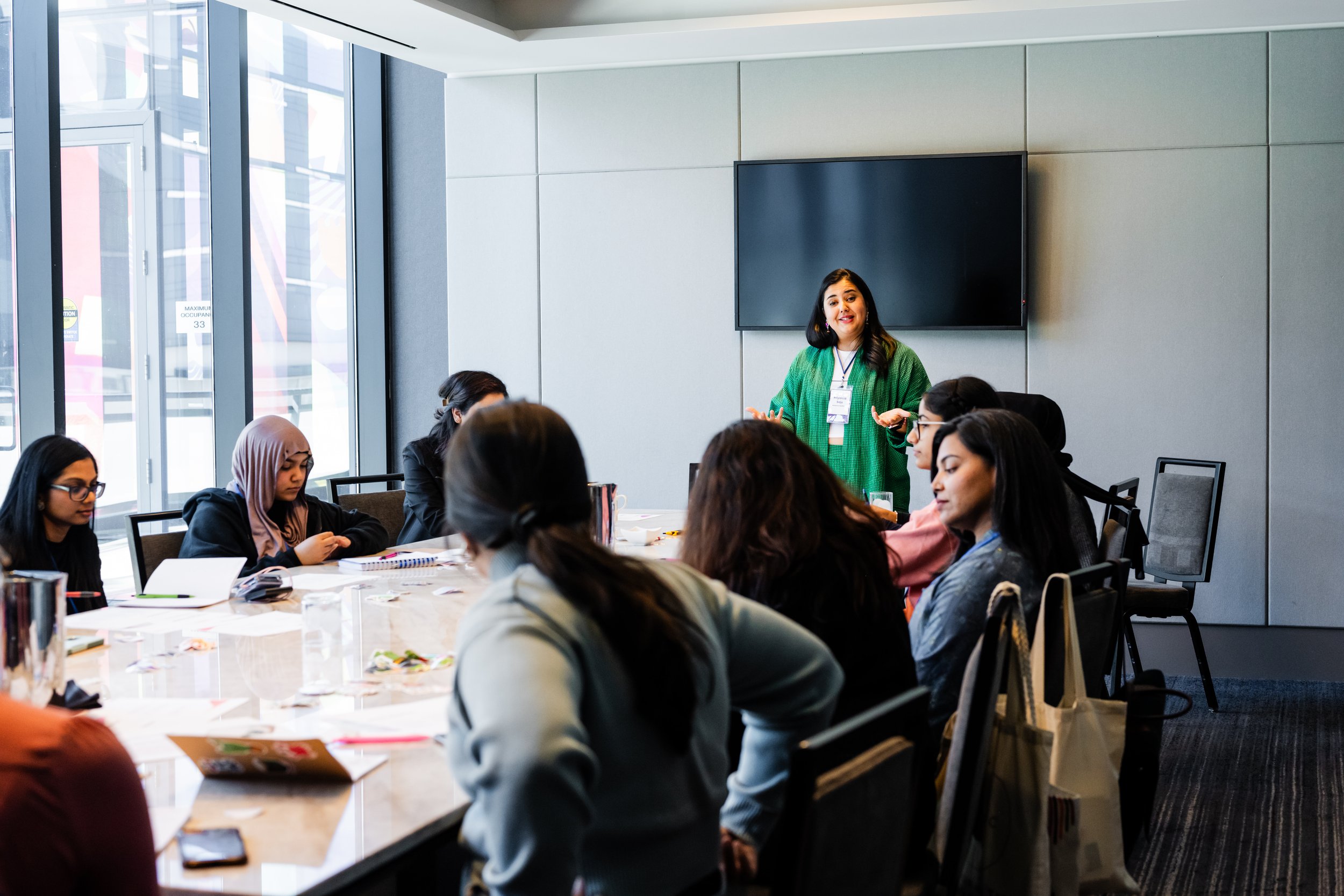The Collective’s Origin Story
South Asian and Tamil Women’s Collective started as a grassroots organization, and we have repeatedly been asked about our name, and why the “T”. The name is beautifully connected to the story of how the co-founders started organizing as self-identifying South Asian and Tamil women in the Markham community to curate well-being initiatives for women and youth.
Several years ago co-founders, Ayesha Syed (she/her), Herleen Arora (she/her), and Pirasanya Gnanasuntharam (she/her) came together to address a community gap of programming to support South Asian & Tamil women and youth in the Greater Toronto Area. They started designing conferences with educators, students, youth, and community members that offered culturally relevant opportunities for young people to get the support and resources to help them navigate their life, relationships, health and well-being.
Our well-being conferences aimed for young South Asian women to connect with and build relationships with adult allies. Since then the collective has grown, and now works in dynamic ways across various spaces. Outside of our core team, we work with a large network of collaborators, creators, experts on a project by project basis.
How we think of the label “South Asian”. It’s complicated.
The term South Asian is a colonial and racial construct (Gandhi, 2014). Historically, it served to problematically group individuals from particular nations together—Sri Lanka, Afghanistan, Bangladesh, Nepal, India, Bhutan, and Maldives—for the purposes of political, economic and geographical conquests (Shankar, 1999).
It is important to recognize the complexity of this racialization, as the term South Asian was also used to identify individuals who were indentured, required refuge, and immigrated from these regions to all of the world’s continents (Gnanadass, 2014). We recognize that groups within the diaspora have suffered at the hands of targeted political and civil actions, oppression and genocide. It is also important to name the intentional historic and on-going erasure of Tamil and minoritized identities from South Asian conversations. We do not take this intra-diasporic tension lightly. We know that intra-cultural differences arising from faith, culture, and traditions are used as tools for neo-colonial oppression to divide our communities from collective efficacy (Anouch, 2014).
As our community works to reclaim the term South Asian to represent the diaspora as a whole; we are committed to doing the same. SAWC will strive for solidarity amongst the South Asian diaspora and across diverse racialized, Black and Indigenous communities by preserving our indigenous knowledges and cultural traditions, recognizing differences, and intentionally fostering unity.
The Creation of SAWC
As current organizational directors, it is diverse community engagements over the last decade that have fueled rich intra-community dialogues, recommendations and learnings. It is our community that has directed our organization into a name change that will continue to be both reflective and inclusive of the current diverse peoples, cultural knowledges and ancestries we advocate for, and will always continue to support.
The collective has grown over the past few years, and has been actively collaborating and engaging with the community to lead research, develop programming, and host events that focus on the economic and social well-being of South Asian women and gender-diverse individuals. Throughout our design process, we ensure our curated spaces foster connection, joy and learning with the community.
As a collective, we are continuously growing and evolving in many ways. We are currently building our infrastructure to become a nonprofit organization in the future.
Our Vision and Values
Our vision is to build a network that supports the social and economic well-being of South Asian women and gender-diverse individuals across Canada through research, programming and events.
The following core values guide our practices, including the ways in which we collaborate as a team, and within communities.
These include the following:
Anti-oppressive and social justice stance - SAWC takes an anti-oppressive and social justice stance by honouring the intra-diversity of the South Asian diaspora and working in partnership and alongside diverse communities to dismantle systems of oppression across gender, gender identity ethnicity, age, race, faith, spirituality, income, sexual orientation, ability, and intersections of identity.
Cultural knowledges - We affirm cultural knowledges through the preservation and engagement of ancestral and cultural assets inclusive of our histories, narratives, stories and traditions.
Intergenerational connection - SAWC leads and creates through intergenerational connection to amplify the strengths, wisdoms and relationships that exist within and across our generations.
Community care - We believe community care is the foundation of togetherness; its cultivation is key to collective healing and well-being.
Collaboration - We prioritize collaboration to break down silos towards community mobilization in the development of shared resources and change.




